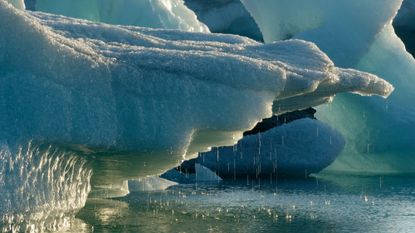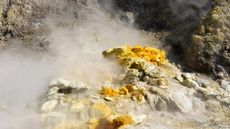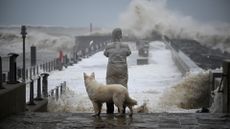6 looming climate tipping points that imperil our planet
A UN report details the thresholds we may be close to crossing


The world is rapidly approaching the "brink of multiple risk tipping points," the United Nations warned in its 2023 Interconnected Disaster Risks report. Risk tipping points, the U.N. explained, are "when the systems that we rely on for our lives and societies cannot buffer risks and stop functioning." Throw in accelerating climate change, and "the very practical consequence will be that much more people will live under very precarious conditions — so loss of life, loss of livelihood and loss of opportunities," Zita Sebesvari, one of the lead authors of the report, told the Los Angeles Times. "It does have cascading impacts."
The U.N. specifically pointed to six tipping points we are rapidly approaching — as well as some ways we can still "take decisive actions to avert the worst of these impacts, and perhaps even forge a new path toward a bright, sustainable and equitable future."
Accelerating extinctions
Human influence has greatly increased the rate of extinctions across the world, helping push the planet into its sixth mass extinction event, with almost a million plant and animal species currently at risk. Given "human activities such as land use change, overexploitation, climate change, pollution and introduction of invasive species, we have put our foot on the extinction accelerator," the report said, and the resulting threat to "our critical life-support systems is vastly underestimated." These extinctions have the potential to cause ecosystem collapses, because species are largely interconnected. "We are increasing the risk of co-extinction," Sebesvari told DW.
Subscribe to The Week
Escape your echo chamber. Get the facts behind the news, plus analysis from multiple perspectives.

Sign up for The Week's Free Newsletters
From our morning news briefing to a weekly Good News Newsletter, get the best of The Week delivered directly to your inbox.
From our morning news briefing to a weekly Good News Newsletter, get the best of The Week delivered directly to your inbox.
Groundwater depletion
Much of the world's drinking water comes from underground reservoirs called aquifers. The bad news is that these aquifers are rapidly emptying, with 21 of the 37 largest aquifers losing water faster than they can be replenished. The water in the aquifers "has accumulated over thousands of years, and would equally take thousands of years to fully recharge," the report said, so these crucial reservoirs are "essentially a non-renewable resource." Approximately 2 billion people worldwide rely on groundwater as a primary source of drinking water, but most groundwater is used in agriculture. "We can no longer consider groundwater as a boundless source of easily accessible freshwater," the report said. And its increasing inaccessibility has "worrying implications."
Mountain glaciers melting
As aquifers empty, the world's glaciers are "melting at double the speed they had in the past two decades," the report said. That increases the amount of freshwater in the short term — sometimes too much, causing flooding — but "many of those glaciers in the Rocky Mountains, the Himalayas and the Andes feed into these rivers and groundwater systems," Caitlyn Eberle, one of the lead authors, told Reuters. "So as those glaciers disappear there is less water available." Many glacier-fed areas are rapidly approaching or have already reached "peak water," the point of maximum meltwater a glacier produces before its freshwater output steadily declines. Meltwater is crucial to sustaining certain regions during dry seasons with low rainfall.
Space debris
The tipping points also extend to space, where floating detritus threatens both current satellites and our ability to put new ones into orbit. Satellites are crucial to our daily lives, from weather reporting and tracking natural disasters to navigating and communicating. "Each piece of debris becomes an obstacle in the orbital 'highway,' making it increasingly difficult for functional satellites to avoid collisions," the report warned. "If we continue on the current trajectory, we risk sacrificing Earth's orbits and the opportunities they offer to society now and in the future."
Unbearable heat
This year, the planet has broken numerous heat records. The warmer temperatures have caused intense heat waves and led to "an average of 500,000 excess deaths annually in the last two decades," the U.N. said. The heat also disproportionately affects more vulnerable populations. Along with its toll on humans, heat exacerbates a number of other ecological problems, including melting glaciers, extreme storms and extinctions. "The reality is that we are quickly approaching a tipping point past which people will not survive," the report stated. As temperatures rise even higher, the heat's impact will get more extreme and harder to reverse.
Uninsurable future
The combination of the aforementioned tipping points means more and more places on Earth are becoming uninhabitable — and uninsurable. There has been a seven-fold increase in the amount of damage from natural disasters since the 1970s. Homes and businesses in disaster-prone areas are starting to see either extremely high insurance premiums or in some cases, little or no coverage as insurance companies pull out. Once home insurance becomes too expensive or unavailable, "people are left without an economic safety net when disasters strike," the report said. As the world gets closer to tipping past these points of no return, "we also lose some of our tools and options to deal with future disaster risk," Sebesvari told Forbes.

Continue reading for free
We hope you're enjoying The Week's refreshingly open-minded journalism.
Subscribed to The Week? Register your account with the same email as your subscription.
Sign up to our 10 Things You Need to Know Today newsletter
A free daily digest of the biggest news stories of the day - and the best features from our website
Devika Rao has worked as a staff writer at The Week since 2022, covering science, the environment, climate and business. She previously worked as a policy associate for a nonprofit organization advocating for environmental action from a business perspective.
-
 5 hilarious cartoons about the George Santos expulsion vote
5 hilarious cartoons about the George Santos expulsion voteCartoons Artists take on Santa versus Santos, his X account, and more
By The Week US Published
-
 Places that are already seeing a boost in tourism due to climate change
Places that are already seeing a boost in tourism due to climate changeThe Explainer Warmer temperatures are moving travelers north
By Devika Rao, The Week US Published
-
 6 snow-or-sun hotels to visit this winter
6 snow-or-sun hotels to visit this winterThe Week Recommends Make your winter dreams a reality at these properties
By Catherine Garcia, The Week US Published
-
 Places that will become climate refuges
Places that will become climate refugesThe Explainer The Midwest may become the new hotspot to move
By Devika Rao, The Week US Published
-
 A23a: why world's biggest iceberg is on the move
A23a: why world's biggest iceberg is on the moveThe Explainer The mass of ice is four times the size of New York and 'essentially' an island
By Chas Newkey-Burden, The Week UK Published
-
 Cop28: is UAE the right host for the climate summit?
Cop28: is UAE the right host for the climate summit?Today's Big Question Middle East nation is accused of 'pushing for a green world that can still have its oil'
By Chas Newkey-Burden, The Week UK Published
-
 Scientists have their eyes on 2 supervolcanoes
Scientists have their eyes on 2 supervolcanoesThe Explainer 'The probability of a catastrophic eruption is low but not nil'
By Devika Rao, The Week US Published
-
 Want to understand climate change? Look to the clouds.
Want to understand climate change? Look to the clouds.The Explainer Scientists are still uncovering the role clouds play in climate change
By Devika Rao, The Week US Published
-
 'Danger to life' warning as Storm Ciarán hits UK shores
'Danger to life' warning as Storm Ciarán hits UK shoresSpeed Read Schools closed and train, plane and car travel disrupted as Met Office issues weather warnings
By The Week UK Published
-
 The drying Amazon rainforest: a drought that affects the world
The drying Amazon rainforest: a drought that affects the worldUnder the radar The Amazon is suffering a drought of historic severity and it’s pushing its inhabitants to their limit
By The Week UK Published
-
 Under Antarctic ice lies a hidden landscape
Under Antarctic ice lies a hidden landscapeSpeed Read Climate change may reveal it over time
By Devika Rao, The Week US Published










